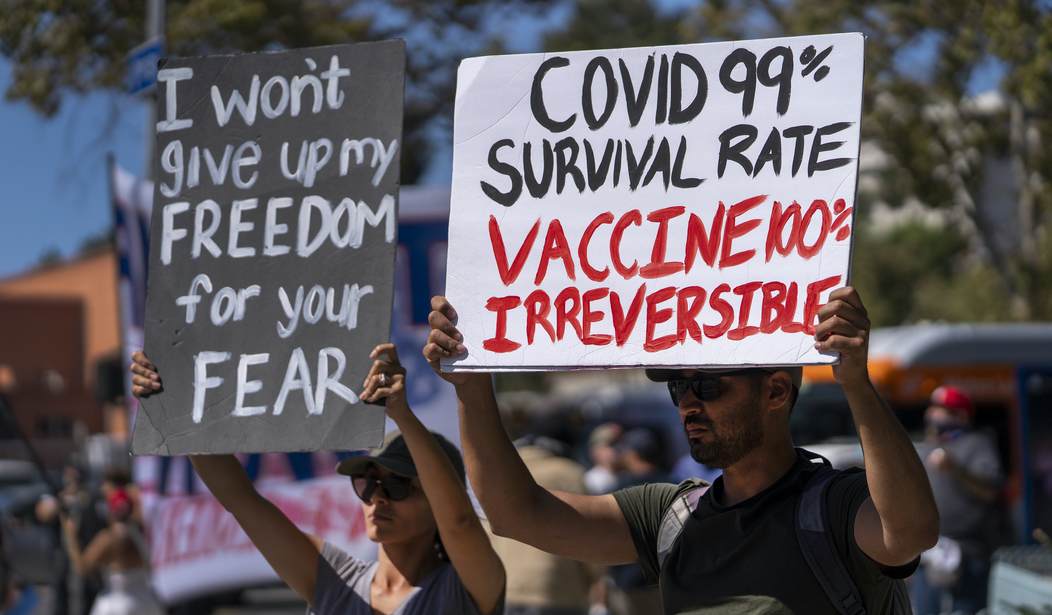As I reported on Wednesday night, the U.S. Supreme Court has agreed to hear oral arguments on January 7 with cases to do with vaccine mandates, including President Joe Biden's vaccine or testing mandate for private businesses with 100 or more employees. Katie covered earlier on Thursday that the response from the White House, with Jen Psaki indicating they were "confident" about the case and called it "a critical moment." Yet the petitioners in the case recognize that much is at stake as well.
Several state Republican attorney generals weighed in and provided statements for Townhall, which included an indication of what direction many of them hope to take next to get or stay involved in the case.
"We look forward to submitting arguments to the Supreme Court on why these mandates are unconstitutional. Missouri is leading the fight," said Missouri's Attorney General Eric Schmitt.
"Limited presidential power is a cornerstone for individual liberty and a free republic. We look forward to defending these liberties against the radical Left’s vaccine mandates in the Supreme Court." said Indiana's Attorney General Todd Rokita.
The Fifth Circuit Court of Appeals had ruled last month in favor of the petitioners, granting and upholding a stay for states including Texas, Utah, Louisiana, Mississippi and South Carolina. It was a 2-1 decision from the Sixth Circuit Court of Appeals last week that had overturned that stay.
"The Court’s expedience shows how important the issue to the public. We are confident the Court will uphold the rule of law," said South Carolina's Attorney General Alan Wilson.
"We appreciate the Supreme Court for moving so quickly to hear these cases, and the states look forward to presenting our position about how the Biden Administration’s unprecedented mandates for healthcare workers and private businesses violate the rule of law and threaten state sovereignty. We’ve challenged all four of the Biden Administration’s mandates, and we’ll continue to stand up for the rights of Kentuckians," shared Daniel Cameron, Kentucky's attorney general who is considered something of a rising star in the party.
Recommended
Montana's Attorney General Austin Knudsen also warned of what's at stake. "President Biden’s illegal mandate is an egregious overreach and sets the country down a dangerous path. This will be one of the most consequential cases for individual rights the Supreme Court has heard in recent memory. If a president can unilaterally force people to submit to a medical procedure they don’t want, then there’s seemingly no limit to the federal government control over our lives," he shared.
Private businesses also filed lawsuits, as I've covered previously.
"Small businesses are very encouraged the Supreme Court has agreed to hear our case against OSHA’s vaccine mandate. Not only would this mandate add kerosene to the labor shortage and supply chain fires, but it is illegal. OSHA does not have the authority to issue a mandate concerning a virus that is present everywhere – not just in workplaces," said Karen Harned, executive director of the NFIB Small Business Legal Center, who is one of the plaintiffs.
Another plaintiff, Alfredo Ortiz, who is president and CEO of Job Creators Network (JCN) also weighed in. "President Biden's vaccine mandate is one of the most important issues facing the country, and the Supreme Court recognized that by agreeing to hear arguments on an application for a stay - the first time they've done that in possibly decades. Biden's vaccine mandate is illegal - a dangerous example of executive overreach - and it will have a devastating impact on our small business community. JCN was the first small business advocacy group to sue the Administration and the first challenger to file with SCOTUS. We look forward to January 7 and we are confident we will prevail," he said.
In addition to filing suit against the mandate as soon as it was officially announced on November 4, JCN engaged in a billboard campaign protesting the mandate.
Another group involved in fighting vaccine mandates has been Airline Employees 4 Health Freedom (AE4HF). The group has received considerable attention for fighting back against a particularly cruel mandate from United Airlines. In a hearing last week Sen. Ted Cruz (R-TX) also called out United's CEO, Scott Kirby in a noteworthy exchange.
"We are encouraged that the Supreme Court understands the need to immediately resolve America’s profound concerns with the OSHA mandate. Airline Employees 4 Health Freedom represents 2000 pilots and airline industry workers who’ve been punished by United Airlines for choosing to honor their faith or follow the advice of their doctor in refusing COVID-19 vaccines. Now, effectively terminated from their jobs, these employees are without paychecks, health benefits, and the ability to secure similar employment. This trampling of civil liberties is a prime example of the impact the OSHA mandate could have on millions of American workers if upheld," said Danielle Runyan, co-founder and director of legislative affairs for AE4HF.
Biden's vaccine or testing mandate for private businesses with 100 or more employees is set to go into effect on January 4. The administration will use Occupational Safety and Health Administration (OSHA) to enforce the mandate. A key question of the case involves whether this is an overreach of OSHA's authority.

























Join the conversation as a VIP Member